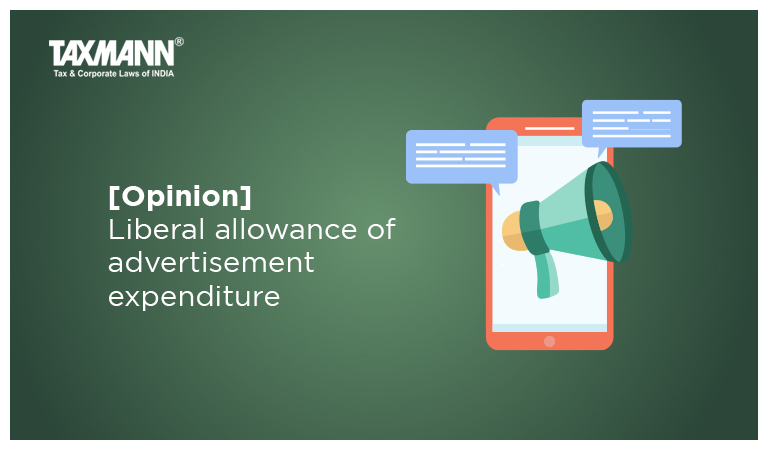[Opinion] Liberal allowance of advertisement expenditure
- Blog|News|Income Tax|
- 3 Min Read
- By Taxmann
- |
- Last Updated on 10 August, 2022

V. K. Subramani – [2022] 141 taxmann.com 174 (Article)
In today’s world of business, geographical barriers have become history because of technology and these days they transcend national borders. While it is a welcome development, it also has its mix of difficulties, both in doing business and collection of correct amounts of tax in respect of the income earned there from. The introduction of equalisation levy 2.0 by insertion of section 165A by the Finance Act, 2016 is a testimony to the effect that the Government is very particular in taking effective measures for collection of tax in the background of the fact that India is not only a big manufacturing hub but also turning out into a massive consumption State. The insertion of Explanation 2A to section 9(1)(i) also brings to the fore the need for treaty between India and other States to overcome the catch contained in the expression ‘Significant Economic Presence’.
1.1 Section 37
Advertisement expenditure is not specifically covered in sections 30 to 36 of the Income-tax Act, 1961 (hereinafter referred to as Act). It is covered by the residuary provision contained in section 37 of the Act. Section 37 says that any expenditure which is not covered by sections 30 to 36 and which is not in the nature of capital expenditure or personal expenditure is deductible subject to the condition that it is laid out or expended wholly and exclusively for the purposes of business or profession. Thus, an expenditure which is not covered by specific provisions but not being a capital or personal expenditure and meant for the purposes of business or profession is eligible for deduction.
1.2 MRF Ltd’s Case
The assessee in this case, formed MRF Pace Foundation (referred as ‘Foundation’ hereinafter) for training bowlers and such activity was no way related to its regular business. The facts of the case relate to assessment years 2006-07 and 2007-08. It incurred Rs.170 lakhs for the purpose running the Pace Foundation and claimed the same as business expenditure. The Assessing Officer was of the view that the expenditure would fall within the purview of “charitable nature” and issued a show cause notice as to why the amount so expended, be not added to its (business) income?
The assessee explained that it is one of the largest corporate sponsors of sports in India and it incurred expenditure for development of pace bowlers, as cricket is the game followed by millions in the country. It was submitted that the term ‘MRF’ became household name in India as the Foundation had built its reputation by developing youngsters to become pace bowlers under the training and guidance of internationally reputed cricket players like the bowling coach Dennis Lillee. The development of wards who got trained through the Foundation became players in the national team and State / district teams and some of them brought laurels to the country. This brought huge publicity to MRF in TV media and promoted MRF products in and outside India. The assessee claimed that they were exporting their products to 65 countries and some of which are cricket playing nations. The expenditure incurred in this sport made a lot of business sense and it enabled the company to reach both domestic and overseas market with ease. On this ground, it was contended that the expenditure so incurred is an allowable expenditure incurred for the purposes of business.
The CIT (Appeals) allowed the claim of the assessee by stating that the assessee by incurring the expenditure promoted its corporate image and brand of the company which enabled it to have better business results. Thus, the assessee succeeded in the first appeal.
Click Here To Read The Full Article
Disclaimer: The content/information published on the website is only for general information of the user and shall not be construed as legal advice. While the Taxmann has exercised reasonable efforts to ensure the veracity of information/content published, Taxmann shall be under no liability in any manner whatsoever for incorrect information, if any.

Taxmann Publications has a dedicated in-house Research & Editorial Team. This team consists of a team of Chartered Accountants, Company Secretaries, and Lawyers. This team works under the guidance and supervision of editor-in-chief Mr Rakesh Bhargava.
The Research and Editorial Team is responsible for developing reliable and accurate content for the readers. The team follows the six-sigma approach to achieve the benchmark of zero error in its publications and research platforms. The team ensures that the following publication guidelines are thoroughly followed while developing the content:
- The statutory material is obtained only from the authorized and reliable sources
- All the latest developments in the judicial and legislative fields are covered
- Prepare the analytical write-ups on current, controversial, and important issues to help the readers to understand the concept and its implications
- Every content published by Taxmann is complete, accurate and lucid
- All evidence-based statements are supported with proper reference to Section, Circular No., Notification No. or citations
- The golden rules of grammar, style and consistency are thoroughly followed
- Font and size that’s easy to read and remain consistent across all imprint and digital publications are applied



 CA | CS | CMA
CA | CS | CMA
